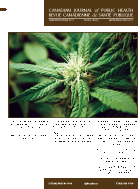The Lower Risk Cannabis Use Guidelines for Canada offer a public health approach to reduce the health risks and burden of disease associated with cannabis use.

A new research study conducted by an international team of experts recommends a public health approach to cannabis - including evidence-based guidelines for lower-risk use - to reduce the health harms that result from the use of cannabis. Led by CAMH scientist and Canadian Institutes of Health Research/Public Health Agency of Canada Chair in Applied Public Health (Simon Fraser University, Vancouver) Dr. Benedikt Fischer, the study is published in the September/October 2011 issue of the Canadian Journal of Public Health (CJPH).
More than one in ten Canadian adults, and about one in three young people aged 16-25, report using cannabis during the past year. Despite the prevalence and health risks associated with cannabis use, the study points out that Canada has not yet taken a public health approach to address adverse health effects of cannabis and factors that appear to modify the risk of these harms on a population level.
The objective of the review paper was to develop 'Lower Risk Cannabis Use Guidelines' (LRCUG) based on research evidence. Some of the harmful practices and patterns of use documented in the study include:
- Cannabis use at a young age - Longitudinal studies suggest that using cannabis from a young age can be associated with a number of problems, including mental illness and dependence. While most cannabis users will not progress to other illicit substance use, those who use cannabis from a young age are far more likely to make this transition.
- Frequent use - Using cannabis often, usually defined as daily or near-daily use, has been linked to a variety of health problems, including cognitive and memory performance, or risk for dependence.
- Cannabis use before driving - Recent data suggests that approximately 5 per cent of Canadian adult drivers report driving after cannabis use in the past year. It is recommended that anyone using cannabis should not drive for three to four hours after consumption.
- Cannabis use during pregnancy - While the possible consequences of cannabis use during pregnancy have not been reliably distinguished from the potentially confounding impact of alcohol and tobacco use, there is sufficient scientific basis to recommend abstinence from cannabis use during pregnancy.
Abstinence is the recommended option to avoid all risks associated with cannabis use. The fact is that a significant proportion of Canadians and especially young adults, consume cannabis. The LRCUG present eight recommendations with factual information on how to reduce the risks for problems and to create screening tools for health professionals to help address the risks.
The next step is for health and education authorities and the wider community to begin discussion of the evidence-based guidelines, and how this information could best be conveyed to key target groups in the context of a broad-based public health approach.
CPHA's endorsement of these Guidelines is congruent with resolutions previously approved at CPHA's AGM (2004 CPHA Resolution No. 3 Psychoactive Drugs - A Public Health Approach; 2007 CPHA Resolution No. 2 Regulation of Psychoactive Substances in Canada- attachment C) that called for:
- comprehensive approaches to addressing the use of psychoactive substance based on an accurate assessment and evaluation of the benefits and risks, with an appropriate balance and integration of the four pillars of prevention, harm reduction, treatment, and enforcement, and also needs to include adequate investments in health promotion, education, health protection, discrimination reduction, rehabilitation, research, and monitoring trends; and
- a public health approach to problematic substance use be central to the development and implementation of a proposed national framework for action on substance use and abuse in Canada.
For details, please contact CPHA.
